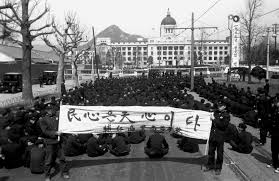The Spark of Democracy: The March 15th Masan Uprising, the March 1960 Presidential Election, and their Impact on South Korea
The Spark of Democracy: The March 15th Masan Uprising, the March 1960 Presidential Election, and their Impact on South Korea
Introduction
The March 15th Masan Uprising and the March 1960 South Korean Presidential Election together hold a significant place in South Korea's history as turning points that ultimately led to the establishment of a democratic government. In this blog post, we will explore the political context leading up to the uprising, the controversial election, the catalyst that ignited the protest, and the lasting impact these events had on South Korea's political landscape.
The Political Context and the Presidential Election
Syngman Rhee was the first president of South Korea, serving from 1948 to 1960. During his rule, the government faced several criticisms, including allegations of authoritarianism, suppression of political dissent, and human rights abuses. These allegations culminated in the March 1960 presidential election when Rhee sought a fourth term amidst growing public discontent. Rhee won the election with a suspiciously high margin that fueled widespread suspicions of electoral fraud. The allegations and subsequent public discontent set the stage for the Masan Uprising.
The Catalyst: Kim Ju-yul's Death and the Masan Uprising
The death of Kim Ju-yul, a high school student who participated in a protest against the rigged elections, was the spark that ignited the Masan Uprising. His body was found on March 15, 1960, leading to an outpouring of public grief and anger. The discovery of Kim Ju-yul's body led to mass protests that erupted across the city of Masan, with citizens demanding justice and accountability from the government. On March 15, 1960, thousands of citizens took to the streets of Masan to protest against the Rhee government. The protesters, led by students and activists, demanded democratic reforms and an end to the government's authoritarian rule.
The April Revolution and The Resignation of President Syngman Rhee
As news of the Masan Uprising spread, protests erupted in cities and towns throughout South Korea. The public demanded the resignation of President Rhee and the establishment of a new democratic government. Under mounting pressure from the public and opposition leaders, President Rhee resigned on April 19, 1960, effectively ending his authoritarian rule.
The Establishment of a New Democratic Government and The Lasting Impact of the Masan Uprising
Following Rhee's resignation, a new democratic government was established, marking a significant milestone in South Korea's political history. The Masan Uprising and the subsequent April Revolution played a pivotal role in shaping South Korea's political landscape. The events led to the establishment of a more democratic government and a shift away from the autocratic system that had prevailed under Rhee's rule.
Conclusion
These events serve as a testament to the power of public protest and democratic expression in the face of governmental corruption. The March 15th Masan Uprising and the March 1960 presidential election were critical junctures in South Korea's path towards democracy, demonstrating the resilience of its people and the importance of the pursuit of truth and justice.




Comments
Post a Comment